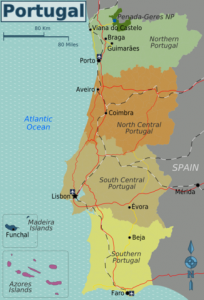By Sarah-Claire Jordan
 Though it may not be the most talked-about country in Europe, Portugal has its charms and interesting history very much linked to that of Spain and neighboring countries. The official language of Portugal, Portuguese, is not as widely spoken as its neighbor, Spanish, but due to Portuguese colonization can be found as far as Africa and Asia, plus Brazil in South America. However, just like many of the countries in Europe that were once populated by different kingdoms, each with their own language. Some of these survived and can be found in Portugal to this day.
Though it may not be the most talked-about country in Europe, Portugal has its charms and interesting history very much linked to that of Spain and neighboring countries. The official language of Portugal, Portuguese, is not as widely spoken as its neighbor, Spanish, but due to Portuguese colonization can be found as far as Africa and Asia, plus Brazil in South America. However, just like many of the countries in Europe that were once populated by different kingdoms, each with their own language. Some of these survived and can be found in Portugal to this day.
Here are three languages that originated in Portugal and are still spoken there today:
1. The Mirandese Language
In some parts of northeastern Portugal, you can hear this language being spoken. The Mirandese language belongs to the Astur-Leonese language group, and has had a distinct phonology, syntax, and morphology since before Portugal became Portugal. The ancient Astur-Leonese language of the northern region of Iberia is its ancestor, and though it is distinct from both Portuguese and Spanish linguistically, it does have a lot in common with many Portuguese dialects. As of 2000, there were about 15,000 speakers of Mirandese, and there are three different varieties of it based on where it is spoken. It was officially recognized as a minority language by the Portuguese government in 1999. All speakers of Mirandese are also fluent in Portuguese.
2. Barranquenho
This is a language spoken on the border between Spain and Portugal, sometimes considered to be a variety of Portuguese with heavy influences from the Spanish dialects spoken nearby. Speakers of both Spanish and Portuguese can easily understand Barranquenho, but it is still considered its own unique language by those who speak it. Something particularly interesting about Barranquenho is that it is a rather recent linguistic development, originating some 200 years ago as opposed to other minority languages of the Iberian Peninsula that can trace their roots back to medieval times.
3. Minderico
With its extinction seemingly inevitable, Minderico remains a language spoken solely at home and not used in schools or any other similar spaces. It originated as a type of secret language used by textile workers in a part of Alacena, Portugal, known as Minde. It was first used in the 18th century, and since then the vocabulary has expanded in many different ways. These changes are limited to the inhabitants and speakers of Minde, who share a common culture and heritage of textile work. The new words that end up being added to Minderico are always related to the common experiences of these people. Now, it has expanded so much that it is used as the language of the people of Minde in political, social, economical, and cultural contexts. It no longer has the characteristics of a sociolect, or a secret language limited to one social group, but this has given it the freedom to evolve more and more, which will be necessary if it is going to survive.



